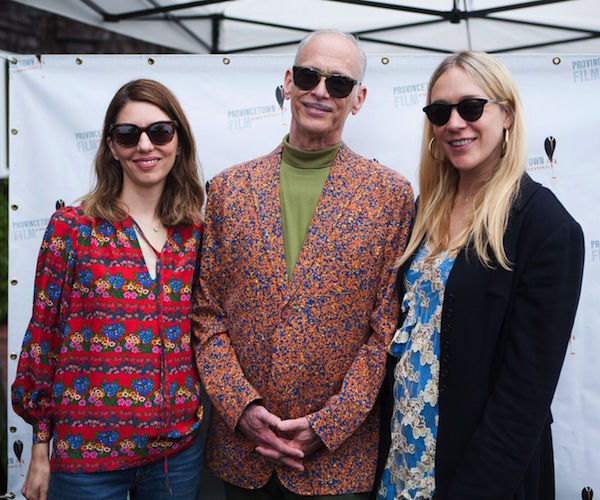Film Feature: Report from the 2017 Provincetown Film Festival
One of the Provincetown Film Festival’s highlights: a documentary on the life of best-selling author Armistead Maupin.

(l to r) Sophia Coppola, John Waters, and Chloë Sevigny at the 2017 Provincetown Film Festival. Photo: Mae Gammino.
By Tim Jackson
The 2017 Provincetown Film Festival this year featured awards for Chloë Sevigny (Excellence in Acting) and Sophia Coppola (Filmmaker on the Edge). Here are some impressions of their Festival interviews.
Chloë Sevigny was interviewed by Eugene Hernandez, co-founder and ex-editor-in-chief of IndieWIRE. The actress, whose personal style has made her a fashion icon, looked terrific dressed in white go-go boots and what she described as “an original design from a thrift shop in Santa Barbara.” Reserved and modest, she has worked with some of film’s quirkiest independent directors. Of ex-boyfriend Harmony Korine she says: “He liked big Italian girls so I, a skinny blond, really had to work on him.” About Korine’s first film, Kids, she confesses, “We were just running around with the camera. We hardly knew we were making a movie.” Regarding Whit Stillman (Love & Friendship and The Last Days of Disco): “He scares me. He’s an absolute perfectionist. He will shoot a line until it’s exactly what he wants.” Of Vincent Gallo (The Brown Bunny): “He’s charming and very persuasive. My mother has not seen the film.”
Unfortunately, the interviewer rambled. Eventually, Sevigny became a bit uneasy about the lack of focus, as well as the excessive questioning about her transgressive role in Brown Bunny. Given the stories she could tell opportunities were lost: the actress has worked with Werner Herzog, Olivier Assayas, Lars Von Trier, Jim Jarmusch, David Fincher, Woody Allen, Mary Harron, Steve Buscemi, and Kimberly Peirce. She may be, as she was once called, the coolest girl in the world.
Sophia Coppola was interviewed by the P-town Festival’s Godfather, John Waters. He was not only appealing and admiring — he was well prepared as well, firing off smart questions about each of her films. The conversation was also significantly helped by the fact that Waters and Coppola share an iconoclastic sensibility as well as a deep (and pragmatic) knowledge of cinema. Coppola has never had a picture “in development” that didn’t get made. She writes all her own films. Her budgets are reasonable. She is friends with actors, directors, and designers. She grew up on movie sets and travels the world. Despite that, she remains self-deprecating about her talent.
About her new film, a ‘remake’ of the Don Siegel/Clint Eastwood 1971 film The Beguiled, Waters asked, “Has Clint seen your version” “As far as I know he has not.”
Waters: “Do you read your reviews?” “I try to avoid the bad ones. I am insecure enough about what I do.”
Waters: “Do you have stalkers?” “No. Nobody knows who I am.”
Waters: “How is it you are so soft-spoken but can pull off hit after hit?” “I have opinions and on the set I know what I want.”
Here are comments on five films at the Festival — chosen at random.
Lucky
This is what could be called a legacy picture. Like Bruce Dern in Nebraska or Sam Eliot in Hero, veteran actor Harry Dean Stanton plays the title character as a blend of the performer’s set-in-stone screen image and as a mouthpiece for observations about old age. Stanton has been cast as a character actor in a long list of films, including director David Lynch’s Inland Empire, Twin Peaks, Wild at Heart, and The Straight Story, which was a Richard Farnsworth legacy film. Lynch, himself, puts in a rare and convincing appearance in Lucky as Howard, a regular at the bar where the town seniors come for breakfast and to share life lessons. Howard’s bellyaching about his pet tortoise — who has wandered off alone into the desert — serves as a too-obvious metaphor for Lucky, who lives a solitary life on the edge of town. He has little time for small talk or niceties, but takes a long walk into town every morning for his coffee and cigarettes. Stanton gives a predictably gritty performance as a nonagenarian — the kind of thing he has been doing for years. Unfortunately, Lucky is more or less a one-note show with a predictable ending. Everybody wears great dentures, and it is inspiring to see Stanton working at his age, but this is a small film that sells a sweet but clichéd look at the elderly.
Lane 1974
From first time director SJ Chiro comes a quiet film based on Clane Hayward’s memoir The Hypocrisy of Disco, the story of growing up in a commune in the early 1970’s.
Lane (Sophia Mitri Schloss) is 13, one of three siblings whose communal living situation is falling apart. Their mother, Hallelujah (Katherine Moennig from Showtime’s Ray Donovan), is way off the grid, which means no sweets and eventually no roof over the clan’s heads. (This is the dark side of the Viggo Mortensen family collective dramatized in last year’s Captain Fantastic.) Director Chiro also grew up on a commune and seems to be exorcising demons.
Hallelujah’s new age life style is abusive and neglectful at one point she encourages Lane to try peyote. When teenager stumbles on Mom in a primal naked embrace with her latest lover, Cloud, the girl has had enough. With mom having already unloaded Lane’s siblings on relatives, Lucky escapes aboard a bus for Las Vegas and an uncertain future with her grandmother. The director is savvy about period details, from the painted school bus to the late hippy wardrobe. Long shots of open fields and highways (Washington State standing in for Northern California) engulf Lane. She is swallowed up by the world. Sophia Mitri Schloss gives a spare performance. Her anxious eyes tell us everything, up to a last The 400 Blows shot where she gazes up and into the camera.
The Untold Tales of Armistead Maupin
Director Jennifer Kroot tells the story of the celebrated author’s evolution. He started off as a conservative Southern boy, which led to a stint in the military and then to a job as a copywriter for Jesse Helms. Maupin eventually became a best-selling author and leading advocate for gay rights. Shifts between interviews past and present effectively show that the brash young man who found himself coming out in San Francisco in the 1970’s is very much present in the 73-year-old author.
Maupin is a confident storyteller with an engaging Southern drawl. He is not shy about his sexual past. The Untold Tales also draws on illustrations, graphics, historical footage, and home movies. One riveting moment features a reading of “Michael’s Letter to Mama,” a fictional ‘coming out’ letter originally published in 1977 by The San Francisco Chronicle. It was written in response to Maupin’s parents’ participation in Anita Bryant’s anti-gay Save Our Children campaign. He knew they would see it. The missive is now read by a series of people, including Laura Linney and Sir Ian McKellen, culminating with a performance of the letter arranged by the Philadelphia Gay Men’s Chorus. The film is a knockout and has been purchased by Amazon. I rushed to Tim’s Used Books on Commercial Street in Provincetown for a copy of Maupin’s novel Maybe the Moon.
Mansfield 66/67
1950s sex goddess Jayne Mansfield reveled in her persona as the hypersexualized alternative to Marilyn Monroe. Her camp resonances have made her a bit of a gay icon. Accordingly, directors David Ebersole and Todd Hughes have enhanced their look at Mansfield’s life with scenes featuring randomly choreographed dancers moving about in candy-colored sets. Several of the hoofers are in drag. The extraneous and overtly stylized parts of the film certainly keep our attention.
Mansfield herself was a bit of a cartoon. In her last days the actress may have fallen under the influence of occultist and founder of the Church of Satan, Anton LaVey. The film claims to be a “a true story based on hearsay and rumor.” Whatever the truth, it makes for a terrific story. In the post film Q&A, the directors declared that they are not sure what is true and what is imagined. Nevertheless, the basic facts about Mansfield and her tragic death are well researched. Mansfield felt the public deserved a good show and she gave them one filled with kittenish giggles and plenty of cleavage. He belies the fact that she was said to have a near-genius IQ. She lived in a pink Beverly Hills mansion; LaVey hung out in a San Francisco townhouse that was painted black and owned by his parents. Mansfield 66/67 is a little long, but it’s a whopping yarn.

A scene from “Blind,” starring Alec Baldwin, left, and Demi Moore.
Blind
On Sunday morning, stuck on a bicycle in a rainstorm, I found I could make one last film. I wandered into Blind, from first time director Michael Mailer. The former producer and oldest son of Norman, he grew up in Provincetown. He has come up with an unfortunate parade of clichés, predictable plot twists, and horrific performances. The movie received a warm round of applause from either a sadly naïve or terribly kind audience.
According to the director during a post-screening Q&A, the script, written by his brother John Buffalo Mailer, was in development for years. It was changed daily by way of suggestions from the actors. Thus Alec Baldwin, Demi Moore, and Dylan McDermott must share the blame. The ham-handed story is about of the wife of a corrupt businessman (McDermott), who has been temporarily incarcerated. His wife (Moore) is mandated to do hours of community service. Assigned to read to a blind author (Baldwin), she begins to see her husband for the obvious scoundrel he always was. Love is blind. You get the idea. No sub-text necessary for this sob story. According to Mailer, the script was considered briefly by the late Mike Nichols. He might have made it work as a pitch black comedy.
Tim Jackson was an assistant professor of Digital Film and Video for 20 years. His music career in Boston began in the 1970s and includes some 20 groups, recordings, national and international tours, and contributions to film soundtracks. He studied theater and English as an undergraduate, and has also has worked helter skelter as an actor and member of SAG and AFTRA since the 1980s. He has directed three feature documentaries: Chaos and Order: Making American Theater about the American Repertory Theater; Radical Jesters, which profiles the practices of 11 interventionist artists and agit-prop performance groups; When Things Go Wrong: The Robin Lane Story, and the short film The American Gurner. He is a member of the Boston Society of Film Critics. You can read more of his work on his blog.
Tagged: Blind, Chloë Sevigny, John Waters, Lane 1974, Lucky, Provincetown Film Festival, Sophia Coppola
